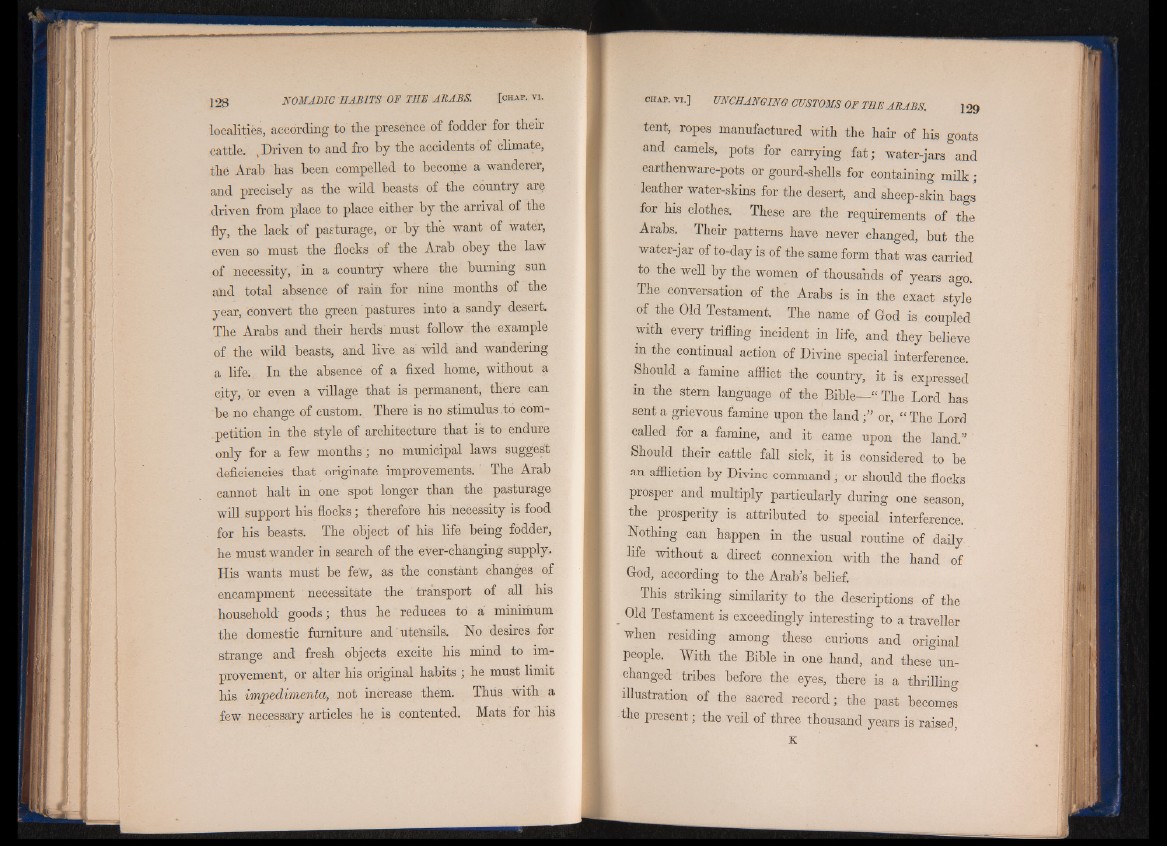
localities, according to the presence of fodder for their
cattle. .Driven to and fro by the accidents of climate,
the Arab has been compelled to become a wanderer,
and precisely as the wild beasts of the country are
driven from place to place either by the arrival of the
fly, the lack of pasturage, or by th*e want of water,
even so must the flocks of the Arab obey the law
of necessity, in a country where the burning sun
and total absence of rain for nine months of the
year, convert the green pastures into a sandy desert.
The Arabs and their herds must follow the example
of the wild beasts, and live as wild and wandering
a life. In the absence of a fixed home, without a
city, or even a village that is permanent, there can
be no change of custom. There is no stimulus to competition
in the style of architecture that is to endure
only for a few months ; no municipal laws suggest
deficiencies that originate improvements. The Arab
cannot halt in one spot longer than the pasturage
will support his flocks; therefore his necessity is food
for his beasts. The object of his life being fodder,
he must wander in search of the ever-changing supply.
His wants must be few, as the constant changes of
encampment necessitate the transport of all his
household' goods; thus he reduces to a minimum
the domestic furniture and'utetisils. No desires for
strange and fresh objects excite his mind to improvement,
or alter his original habits ; he must limit
his impedimenta, not increase them. Thus with a
few necessary articles he is contented. Mats for his
tent, ropes manufactured with the hair of his goats
and camels, pots for carrying fat; water-jars and
earthenware-pots or gourd-shells for containing milk ;
leather water-skins for the desert, and sheep-skin bags
for his clothes. These are the requirements of the
Arabs.^ Their patterns have never changed, but the
water-jar of to-day is of the same form that was carried
to the well by the women of thousands of years ago.
The conversation of the Arabs is in the exact style
of the Old Testament. The name of God is coupled
with every trifling incident in life, and they believe
in the continual action of Divine special interference.
Should a famine afflict the country, it is expressed
m the stern language of the Bible—“ The Lord has
sent a grievous famine upon the land;” or, “ The Lord
called for a famine, and it came upon the land.”
Should their cattle fall sick, it is considered to be
an affliction by Divine command ; or should the flocks
prosper and multiply particularly during one season,
the prosperity is attributed to special interference.
Nothing can happen in the usual routine of daily
life without a direct connexion with the hand of
God, according to the Arab’s belief.
This striking similarity to the descriptions of the
Old Testament is exceedingly interesting to a traveller
when residing among these curious and original
people. With the Bible in one hand, and these unchanged
tribes before the eyes, there is a thrilling
illustration of the sacred record; the past becomes
the present; the veil of three thousand years is raised,